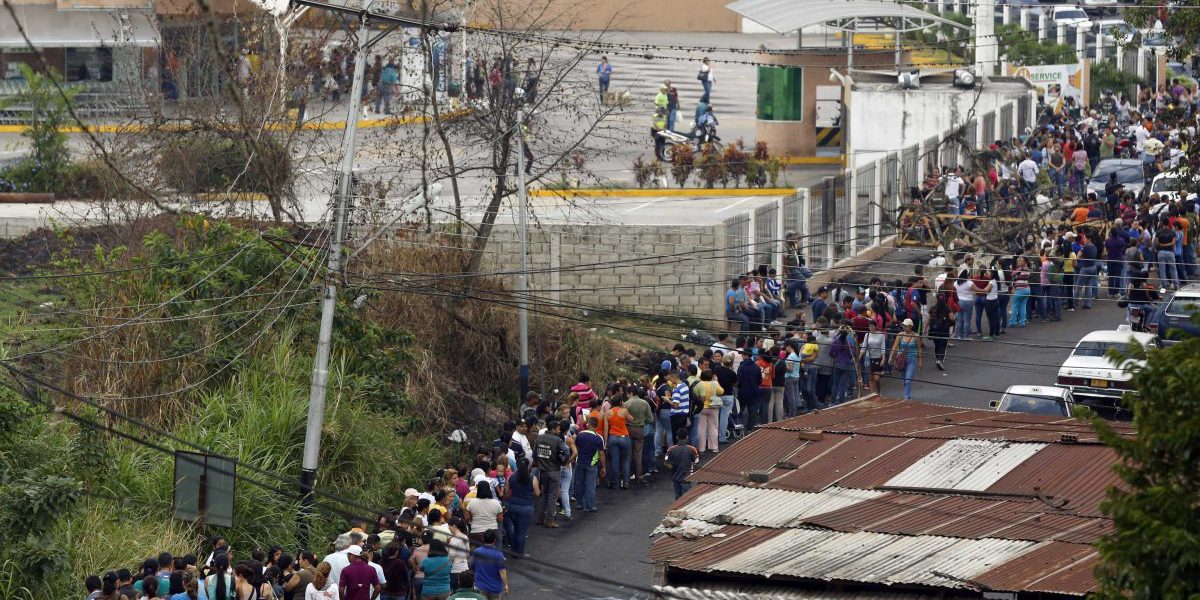By Lisbeth Coiman. ® Copyright material
In Guarenas, an old woman lines up in the bank to claim her pension of Bs.160,000, the equivalent of $10 (give and take a few dollars depending on the exchange rate). She rests on one foot seeking relief for her twisting spine, crooked from advanced arthritis. The bank is located in an almost empty mall, in this suburban city some 40 miles east of Caracas, Venezuela’s capital. Seniors speaking in hushed voices filled the bank since early hours of the day. Their generation grew up with a dictator, and they remember the consequences of expressing opinions in a totalitarian regime. The woman with the twisting spine listens to the man ahead of her in the queue. He is arguing with the teller, unable to accept her explanations. When the old woman’s turn is up, she greets the teller with her perfect denture smile; then, shakes her head in disbelief at the latest news affecting seniors in Venezuela. The regime seized the seniors’ pensions.
The old woman worked hard as a secretary since she was 14. She married young, and raised 7 children and six grandchildren. But the regime considers that her pension is a luxury that needs to be controlled. She would be paid in installments, barely enough to buy her an item of food a day. The first installment of the woman’s pension would be the largest, Bs. 30,000.00 ($2). She must come back every day to have her money released anywhere from Bs. 20K to 10K at the time ($1.20 to 0.65).
After gulping her bitterness in the bank, the woman with the twisted spine and thyroid problems lines up to buy food. Although she would be allowed to go in the front of the line, she still needs four or five hours to buy one food item. Beef Bs. 20,000. Pork, Bs.24,000 /Kg, Chicken Bs. 17,000. Split rice, Bs. 17,000. Sugar Bs.15,000. Coffee Bs.24,000. Whole milk (powder) Bs.35 to 38K. The woman is helping raise her great grandchildren because her grand-daughter, a single mother of two working full time can’t afford to live on her own. The basic needs of a young family quickly add up to the old woman’s expenses. Feminine napkins, for instance, cost Bs.5,000 for a packet of six. The old woman must also tour five or six drugstores looking for a small supply of the Eutirox, the medicine she needs daily for her thyroid problems.
The woman doesn’t have a car and couldn’t drive even if she had one. She lives in remote location and must take the bus, risking robbery at gun point. If she is lucky, she’d be stripped of her money, telephone, and clothes. Yes, clothes too! But if she isn’t she can be killed. She doesn’t join demonstrators, doesn’t tweet her disappointment or anger. Her contribution is to take care of her great-grandchildren so that their mother can go to work. She will probably be home by five of six, after an entire day of surviving in a great country gone wrong.
This is happening in Venezuela today, an oil rich nation that enjoyed record breaking oil revenues for 15 years from 1999 to 2014.
© Lisbeth Coiman and lisbethcoiman.com, and www.gingerbreadwoman.org, 2017. Unauthorized use and/or duplication of this material or parts of it without express and written permission from this site’s author and/or owner is strictly prohibited. Excerpts and links may be used, provided that full and clear credit is given to Lisbeth Coiman and lisbethcoiman.com and www.gingerbreadwoman.org with appropriate and specific direction to the original content.







